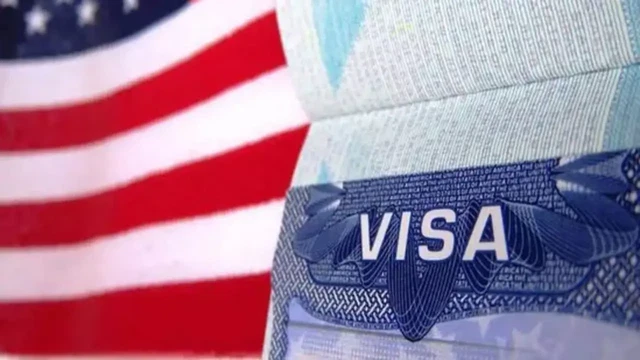The US H-1B visa has long been a pathway for US employers to target foreign talent seeking high-paid work in America. The visa has been particularly attractive for skilled professionals across finance, healthcare, and technology fields. However, recent policy shifts by Trump include prioritization of higher-paid applicants and a striking increase in fees, which tends to reshape global mobility.
The changes echo beyond the United States and ultimately create new opportunities as well as pressures for labor markets globally. It is clearer that the United Arab Emirates, the fastest-growing hub in the world, is to benefit from dramatic fee increases in the US H-1B visa, as it offers attractive residency options and strong sectoral demand.
Let’s dive into the article to know how the US H-1B visa is affecting the UAE job market!
What’s Changing in the U.S: An Overview
On September 19, 2026, Trump released his plans to command US$100,000 on every application for an H-1B visa. The sweeping proposal also emphasizes higher-paid beneficiaries for new H-1B sponsorships. These modifications, alongside a 26% increase in the current fee, are intended to reduce low-paid outsourcing and prefer high-waged employees.
Besides, the long-established gateway for foreign talents has now become an incredibly expensive pathway, with uncertainties surfacing for voluminous internal professionals and companies that sponsor them.
1. Immediate Effects Linked to Changes
Ultimate shifts in foreign talent acquisition visa implications mean a rise in uncertainties among the foreigners as well as hiring firms. The recent policy change by Trump has established barriers to work in the US, allowing workers and private firms to reassess their decisions. Employers previously dependent on H-1B visas may now approach remote-first projects and even drive more startups to other established regions like the UAE.
2. Why the UAE is Well-Positioned to Benefit
The United Arab Emirates already provides an appealing package to global professionals, including:
- Zero personal income tax
- Diverse visa routes (Green, Golden, long-term skilled permits)
- World-class infrastructure
- Active investments in finance and tech hubs
Various experts and analysts predict the hiked fees on H-1B visa applications will mark an uptick in interest from candidates who now see the UAE as a more practical, thriving, and cost-effective destination.
Sectors Likely to Encounter Shifts

1. Tech & Finance
Prominent finance and tech-focused firms, established in the US, pull global talent in quantitative finance, AI, cloud, and software, with allocations dominantly based on the H-1B visa program. Trump’s newly introduced barriers at a time when the UAE is trying to scale for its fintech and digital ambitions have opened unexpected passages for the country.
2. Healthcare
In case of tightened access for foreign-trained clinicians, many professionals and doctors may favor Middle East options for transparent licensing programs and high wages. While many senior, highly-paid talent may still favor the US, a massive influx of mid-career specialists might choose the UAE for its tax advantages and faster paths to residency.
Overall Effect on UAE Talent Demand and Wages
The inflow of foreign skilled professionals can reduce local skill shortages in the UAE, while pushing employers to offer higher compensation for in-demand roles, which specifically include full-stack software engineers, digital adoption specialists, and business development managers, among others.
As sponsorship, cost effectiveness, and Emiratisation policies shape the UAE’s labor market, an increase in wages is evident, specifically in sectors where employers compete globally. But to benefit from H-1B visa barriers, the UAE needs a faster scaling in the top in-demand sectors, while encountering wage pressure in niche roles.
How Employers in the UAE will Respond
1. Aggressive Talent Acquisition
To draw more foreign talent, local and multinational companies in the UAE will headhunt and enhance hiring perks for expats by offering flexible residency support and relocation packages.
2. Expansion of UAE-Based operations & Remote-First Strategies
Multinational companies, like Google, Microsoft, and Meta, with already scalable presence in the UAE, might expand their operations through Gulf headquarters. Many firms can also host global projects through their regional centers, while sustaining their leadership in primary company hubs.
3. Investment in Training
A substantial proportion of US H-1B visa holders includes professionals from India, the Gulf regions, and China. Benefiting from the proposed US$100,000 H-1B visa cost, many firms and established companies can partner with universities to convert regional talent into immediately employable professionals.
Recruitment consultants and travel agencies are reporting disruption caused by Trump’s imposition of an unfavorable fee on H-1B visas. The agencies also report a spike in application traffic and candidate inquiries to explore Gulf opportunities.
Risks and Countervailing Factors
While specific talent will reroute to the UAE, many professionals still value the United States for its unrivaled research ecosystem, long-term immigration opportunities (Green cards), venture capital access, and academic pipelines. Regulatory hurdles or family migration preferences can also curb the flow to the UAE.
The United Arab Emirates must address the rising living costs in developed cities and ensure that its emphasis on drawing expats does not push out local workforce development. Also, the region is likely to witness a dynamic talent fight due to extremely high competition for professional opportunities in Saudi Arabia and other developed Gulf states.
Practical Tips for Employers and Jobseekers
For Employers:
- Develop flexible payment models (with allowances alongside base pay) as well as accelerated hiring pipelines.
- Consider remote hubs for project works while assessing long-term resident hiring.
For Jobseekers:
- Look for cross-border project work and prefer remote collaboration experience.
- Prefer transferable skills through portfolio projects, cloud certifications, and technical experience.
- Target roles associated with long-term residency options (Green/Golden visas).
Change in US H-1B Visa Program: Why Timing Matters

The recent shift in H-1B visas coincides with the active expansion of the UAE into healthcare, tech, and finance projects. This vital draw, paired with the region’s proactive visa reforms and business incentives, can change the temporary surge in professional inflow into a long-term relocation trend. However, the overall success still depends on the UAE’s potential to convert external talent into innovation-driving sectors and strategic policy measures.
Long-Term Structural Outcomes
If US H-1B reforms persist, the world is likely to witness a multipolar talent division across Europe, North America, and the Gulf regions. With each area specializing in different types of talent, the UAE could solidify its role as a regional hub for remote R&D centers and mid-tier specialists.
This structural division may also promote clearer opportunities for resident professionals, enhanced international recognition, and a robust local talent ecosystem, which align closely with the UAE’s economic diversification goals.
Closing In
The H-1B policy reforms are redefining the paths for foreign talent, while unfolding a strategic entryway for the UAE. This dramatic US$100,000 fee on H-1B visa applications is an opportunity for the UAE to draw mid-career professionals, sharpen acquisition programs, and strengthen sectoral potentials, particularly in healthcare, finance, and tech.
However, the outcomes largely depend on competitive remuneration packages, streamlined licensing policies, and visa clarity. For employers and professionals, it is the right time to seize the opportunity, assess residency options, and build attractive hiring models.
Explore More...






